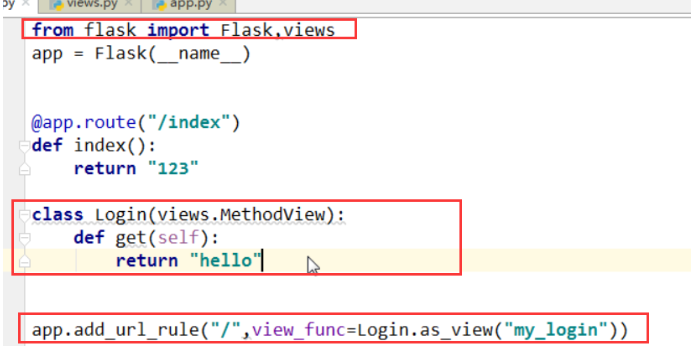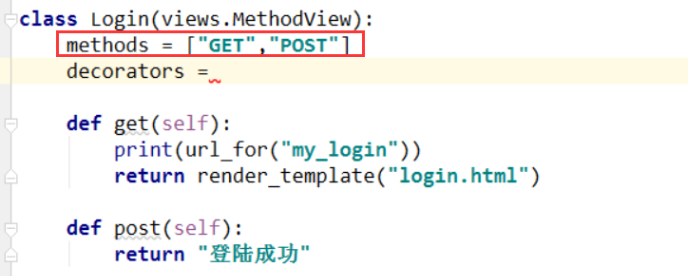from flask import Flask,views app = Flask(__name__) class Login(views.MethodView ): def get(self): return "hello" app.add_url_rule("/",view_func=Login.as_view("my_login"),methods=["GET"]) app.run("0.0.0.0",5000,debug=True)

methods的用法

也可以在这里用

将cbv 中的类里面的函数变成fbv中的函数,本质上还是fbv
2.网络相关
192.168.13.0-192.168.13.255
00000000,11111111,192.168.13.1不能用
能用253个
192.168.13.130/24 11111111.11111111.11111111.00000000-11111111 192.168.1.0-192.168.1.255
192.168.13.47/16 11111111.11111111.0000000.00000000 192.168.0.0-192.168.255.255
192.168.13.61/17 11111111.11111111.10000000.00000000 192.168.0.0-192.168.127.255
192.168.13.47/30 1111111.11111111.11111111.11111100 192.168.13.0-192.168.13.3
192.168.13.47/18 11111111.11111111.11000000.00000000 192.168.0.0-192.168.63.255
3.位运算
或运算
print(255|128)#255 11111111 10000000 11111111 (只要有1就为1)
非运算
print(255|128)#127 11111111 10000000 01111111
与运算
print(255|128)#128 11111111 10000000 10000000
4.ip地址分类
A类:255.0.0.0,包括的可用地址最多 B类:255.255.0.0 C类:255.255.255.0
5.flask上下文werkzeug
from werkzeug.serving import run_simple from werkzeug.wrappers import Response,Request @Request.application def app(req): print(req.method) #get print(req.path) #/ return Response("ok") run_simple('0.0.0.0',5000,app)
6.偏函数
from functools import partial def add(a,b): return a+b par_add=partial(add,1) print(par_add(2))#2
应用:函数在执行时,要带上所有必要的参数进行调用。但是,有时参数可以在函数被调用之前提前获知。这种情况下,一个函数有一个或多个参数预先就能用上,以便函数能用更少的参数进行调用。
7.线程安全
import time import threading from threading import local class Foo(local): pass foo = Foo() """ { 7172:[request,session], 8076:[request,session], 5784:[request,session], } """ def add(i): foo.num=i time.sleep(1) print(foo.num,i,threading.current_thread().ident) for i in range(20): th = threading.Thread(target=add,args=(i,)) th.start()
8.wsgiref实例
对于python web程序来说,一般会分为两部分:服务器程序和应用程序。服务器程序负责对socket服务器进行封装,并在请求到来时,对请求的各种数据进行整理。应用程序则负责具体的逻辑处理。为了方便应用程序的开发,就出现了众多的Web框架,例如:Django、Flask、web.py 等。不同的框架有不同的开发方式,但是无论如何,开发出的应用程序都要和服务器程序配合,才能为用户提供服务。这样,服务器程序就需要为不同的框架提供不同的支持。这样混乱的局面无论对于服务器还是框架,都是不好的。对服务器来说,需要支持各种不同框架,对框架来说,只有支持它的服务器才能被开发出的应用使用。这时候,标准化就变得尤为重要。我们可以设立一个标准,只要服务器程序支持这个标准,框架也支持这个标准,那么他们就可以配合使用。一旦标准确定,双方各自实现。这样,服务器可以支持更多支持标准的框架,框架也可以使用更多支持标准的服务器。
WSGI(Web Server Gateway Interface)是一种规范,它定义了使用python编写的web app与web server之间接口格式,实现web app与web server间的解耦。
python标准库提供的独立WSGI服务器称为wsgiref。
from wsgiref.simple_server import make_server def runserver(environ,start_response): start_response("200 ok",[("Content-Type","text/html")]) return [bytes("<h1>hello aa</h1>",encoding="utf-8")] if __name__ == "__main__": httpd=make_server("",8000,runserver) print("运行了") httpd.serve_forever()
